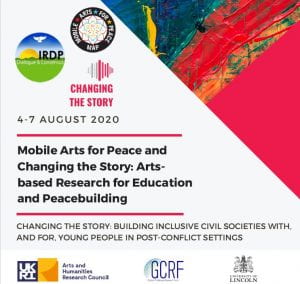7th September 2020
Reflections from MAP Rwanda Project Coordinator – Victor Ntezirembo
From 5 to 7 August 2020, the Institute for Research and Dialogue for Peace (IRDP) hosted the Mobile Arts for Peace (MAP) and Changing the Story (CTS): Arts-Based Research for Education and Peacebuilding Conference. The conference brought together over 40 participants online from around the globe, including the United Kingdom, Colombia, Kyrgyzstan, Cambodia, Nepal and Indonesia, as well as 38 participants, including students, teachers and dialogue facilitators, physically at IRDP from different regions of Rwanda, who have been trained in the Mobile Arts for Peace (MAP) approach. During Zoom sessions that spanned over three days, participants discussed how arts can be used to advance peacebuilding in societies emerging from conflict.
The discussion focused on MAP’s aim to work with young people, educators, cultural artists and civil society organizations to inform national education curricula in music, dance and drama. MAP works alongside partners to design and deliver arts-based peace education projects. Different organizations, including the National Unity and Reconciliation Commission, Aegis Trust, Never Again Rwanda, UNESCO and the Rwandan Education Board, shared their experiences of the role of arts in Rwandan peace education. These presentations showed how art has been integrated into the initiatives of all of these organizations to complement more traditional approaches to help the Rwandan society to come to terms with the events of the 1994 Genocide Against the Tutsi. The representative of UNESCO Rwanda encouraged youth to compete for different grants under that institution.
The conference showcased how art and performance are concretely used as a tool for peace education in Rwanda. Participants watched a forum theatre performance that had been created by MAP participants in Rwanda revealing the struggles of a disabled student facing discrimination at school. In breakout groups, participants discussed the root causes of this discrimination and possible solutions at the family, community and national level. The exchanges will feed into a set of policy briefs, which will be shared with policymakers in Rwanda and beyond.
On the last day, participants of the conference dived deeper into MAP methodologies. Students and teachers shared their experience of how MAP changed their way of learning and teaching. They highlighted the arts- and student-centred approach of MAP, which helps to empower students and to promote their self-confidence. The young students stressed how MAP makes them feel like equal participants in policy discussions and how the MAP approach helps them to overcome fear to participate actively in conversations at school or with policy makers.
In addition, participants discussed the fundamentals of peace mediation and conducted a conflict analysis and a mediation simulation using arts-based tools to better understand the root causes of conflict.
Comments from participants outside of Rwanda commended the success of MAP in Rwanda and made a comparative analysis of how the Rwandan experience can be applied to their respective countries. Researchers working on Kosovo and Cambodia highlighted their similar post-conflict situations and appreciated how young students, in partnership with teachers and parents, are essential to the peacebuilding process.
Chaste Uwihoreye, who was Safeguarding Coordinator for the event, works with Uyisenga Ni Imanzi as a MAP partner organisation, which provides child and youth focused programs to support the needs of orphan headed households in Rwanda. Chaste described how:
‘It was exciting how the participants and policy makers were enthusiastic about the MAP methodology. As psychologist and psychotherapist, I realized that the MAP Methodology provides simple tools and practices that help people to learn from behaviours and understand and resolve problems. It provides a way of sharing feelings and testimonies with others as an important foundation of peace building and cohabitation. It was a pleasure for me to be part of the event. I learnt a lot and I have been inspired.’
The event was a remarkable success, both in terms of organization and lessons learned through exchange and discussion. It is also worth noting that the digital world is still a challenge for many organisations as they aim to continue their work and foster collaborations during COVID-19. However, the digital focus transformed the event into a positive opportunity, especially for future workshops and meetings and for planning or expanding MAP in other platforms via digital tools.
